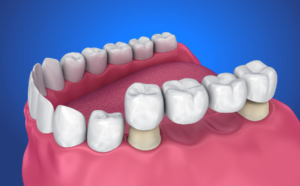
Today, dental bridges are among the most common restorative dentistry treatments that are done to replace missing teeth. Despite their popularity, some people hesitate about getting them because there are other solutions for their problems, including partial dentures and partial dentures supported by implants.
However, all of these options come with their own set of pros and cons. This is why you must consult with your dentist as they can recommend a treatment that is best for your particular case. With that being said, it wouldn’t hurt to know more about dental bridges if you are considering this option:
What Are the Pros of Dental Bridges?
Dental bridges can effectively replace missing teeth because the artificial teeth used for bridges can match your natural teeth. They can also fill gaps and restore your smile to what it was like before. This means you’ll gain your confidence and self-esteem back, especially when you have to talk to people or be in public.
When you lose one or more teeth, the remaining teeth will start shifting to fill in the gap. This can change your bite and affect the way you eat and speak. When you get a bridge, it can hold the other teeth in place so that your bite won’t get distorted.
You may find a dental bridge more comfortable than a traditional partial denture. The latter comes with an additional bulk that could feel weird in your mouth. Dental bridges don’t have that, so you’ll be able to adjust to one more easily. Unlike dentures that have to be removed from your mouth when you clean them, dental bridges can be brushed as you usually brush your natural teeth!
What Are the Cons of Dental Bridges?
The teeth on either side of your missing teeth will be modified to hold the crowns that will serve as the anchor for the bridge. Of course, as the enamel from those teeth is removed, the risk of tooth decay increases as well, which is a risk as bacteria can seep underneath the crown. When that happens, and the anchor tooth gets infected, it may not be able to provide support for the bridge. Then that specific tooth will be removed, and you will have to get another bridge.
Compared to implants, traditional dental bridges are not as stable because they are only anchored to two teeth and not supported by the jaw at all. There are also reports from some patients claiming that they experienced heightened sensitivity after getting a dental bridge. Some say this is a temporary occurrence, while others say it’s permanent for them.
Compared to implants, bridges are significantly cheaper. Because of this, they have to be replaced every 10 to 15 years, while implants are a lifelong solution. You might want to consider this when you decide between the two options, keeping in mind that as the years pass, bridges might get more expensive!
Conclusion
When you lose your teeth, you are going to need urgent dental care from your dentist. They will determine which course of action is best for your case, but your preference will still be considered. Think carefully when deciding between the restorative options because you’ll have to live with whatever you choose for many years. Hopefully, the pros and cons of bridges that were pointed out in this article will help you decide if it’s the right treatment for you!
Home of Smiles Dental Clinic is a trusted family dental clinic in Edmonton, AB, that can provide you with restorative dentistry solutions for your missing teeth. We also offer complete dental services for every member of the family! Contact us today to schedule your appointment!

